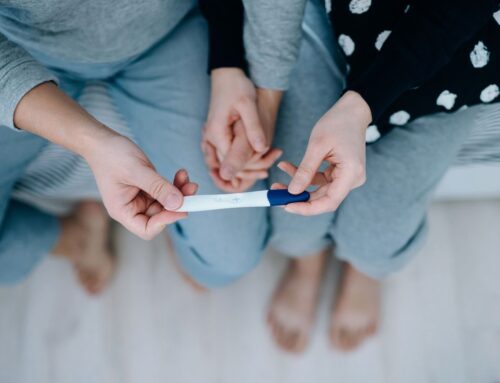It’s a misleading platitude that “pregnant women should eat for two.” On the surface, this makes sense. There’s another little body inside your own – shouldn’t you at least be eating more, if not twice as much?
The answer is no, and we created this guide to:
- Help you understand why it’s not true, and
- Help you make healthier eating choices for your baby (and, as it turns out, yourself!)
Should I Really “Eat For Two”?
Eating more isn’t the right answer, but you should eat smarter.
Why? During pregnancy, your body becomes more efficient. It learns to absorb nutrients better, because they’re so essential for your baby’s healthy development. Eating a lot more won’t have a beneficial outcome, because your baby is already getting what it needs from your current diet. In fact, it can have the opposite effect. Eating more food can result in unhealthy weight gain, which can lead to pregnancy complications, like gestational diabetes. For more information, check out our series of posts on pregnancy complications. The first one is here.
Plus, a lot of the nutrients that go to your baby actually come from your bones and body tissue, not the foods you eat. In short, increasing your overall food intake will have more of an effect on your own body than your baby’s, and that effect is usually undesirable.
But I Have To Eat A Little More, Right?
Yes, your overall caloric intake should increase a little over the course of your pregnancy. Helpfully, the Institute of Medicine has created a suggested guideline for managing your calories while you’re pregnant:
- During the first trimester, you don’t need to increase your daily calories at all.
- During the second trimester, you should increase your daily intake by around 340 calories.
- During the third trimester, increase by about 450 calories a day.
Note that those numbers assume that you’re at a healthy weight before you become pregnant. Consult a doctor or other medical professional if you’re unsure whether or not you’re weight is healthy.
So what do those numbers look like in practice?
- 340 calories is roughly equal to 20 almonds, an apple, and a small cup of milk.
- 450 calories looks like two small oranges, one container of low-fat yogurt, a bowl of cornflakes and the milk to go with it.
But more important than upping your calorie count is to increase it with the right things.
So What Should I Eat More Of?
If you’ve read this far, you might have the impression that your baby “gets what it needs.” Whether or not you ingest enough Vitamin B doesn’t matter, because your baby can just make up the difference by drawing on your own body’s existing supply. And that’s not true.
The Mayo Clinic lists the following nutrients as most important during pregnancy:
- Folate and folic acid – Two types of B vitamin that have been shown to reduce the risk of serious birth defects.
Foods high in folic acid include leafy greens, like kale and spinach, citrus fruits, and greens.
- Calcium – Helps your baby’s bones and teeth grow strong.
You can find calcium in leafy greens, soybeans, and some types of fish, including salmon and trout.
A lot of foods are “fortified” with calcium, which just means that some sort of calcium has been added to them during their processing stage. That’s fine, and foods with added nutrients are a good way to get what you and your baby need.
But according to Marion Nestle, a professor of nutrition at New York University, the processing of any food “destroys nutrients. Fortification adds back some nutrients, so overall you’re better off with a processed fortified food than a processed unfortified one. But a whole food is always going to be superior.” You can read more from Nestle, here, at the Wall Street Journal’s website.
- Vitamin D – Another vitamin that helps build healthy bones.
Fish, like tuna and salmon, and dairy products are high in Vitamin D.
- Protein – Most of your body’s structures, muscles, organs, skin, are made out of protein. Obviously, your baby (whose body is still growing in a very literal sense) needs a lot.
Find high levels of protein in foods like eggs, milk, poultry, and peanut butter. Cottage cheese is an especially great source, with 28 grams of protein in every cup.
- Iron – Iron is an essential part of your blood cells. In part, it makes it possible for them to transport oxygen throughout your body. During pregnancy, your blood supply increases a huge amount. Essentially, you’re making all the blood that will be used in your baby’s body, too. So your daily iron requirement doubles.
Iron is high in both red and white meats, like beef, pork, and poultry. Most fish, including halibut, haddock, salmon, and tuna have a good amount of iron, too.
You can find the Mayo Clinic’s full list of nutrients for pregnant women here.
Avoid Mercury
 Although we’ve recommended fish as the source of several essential nutrients, there are certain types you should avoid:
Although we’ve recommended fish as the source of several essential nutrients, there are certain types you should avoid:
- Tilefish
- Swordfish
- Mackerel
- Shark
These fish are very high in mercury, a naturally-occurring element, but one that can harm your baby’s brain and eye development. There’s a general rule that you should eat no more than 12 ounces of fish every week, because all fish contain at least some mercury.
How Do I Plan My Pregnancy Diet?
The USDA’s Choose My Plate program, which replaced the old “Food Pyramid” guide, has a special section for pregnant women and those breastfeeding. You’ll need to register for a free account, but after that you can create a “Daily Food Plan For Moms.” The plan can calculate your nutritional needs and even suggest entire meals! Sign up here.
And always, always, always consult your doctor. They should be able to guide your dietary choices better than anyone else.





